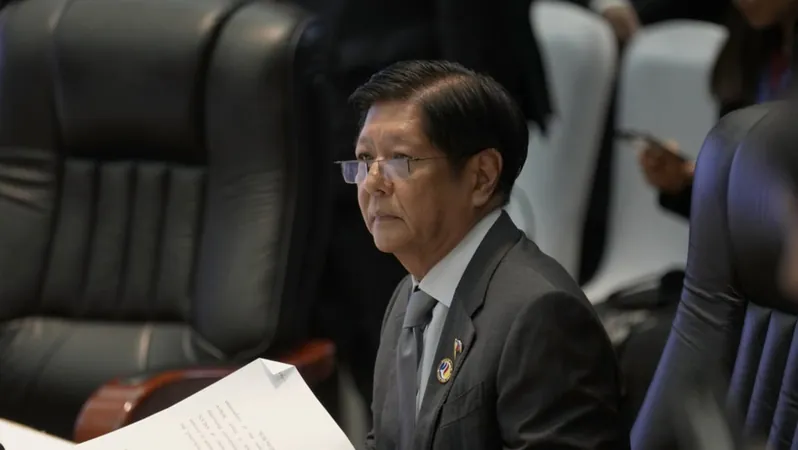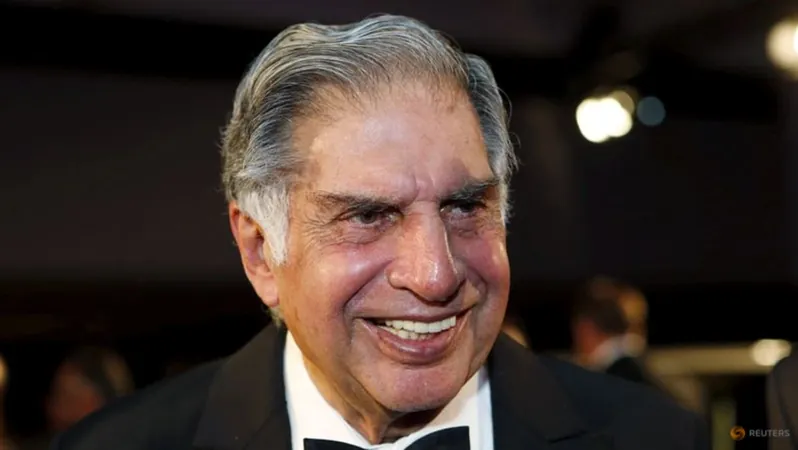
Urgent Call for Action: Philippines Demands Acceleration of South China Sea Code Negotiations
2024-10-10
Author: Li
VIENTIANE: Philippine President Ferdinand Marcos Jr. has passionately urged Southeast Asian leaders and China to expedite the negotiations for a code of conduct in the South China Sea during a pivotal regional summit on October 10. Marcos underscored the necessity of achieving substantial progress and urged all parties involved to be open to effectively managing their differences and reducing tensions.
Tensions between China and the Philippines have escalated due to a series of confrontations in the contested waters of the South China Sea. Manila has accused the Chinese coast guard of aggressive actions, while Beijing has expressed its anger over what it views as repeated provocations and territorial incursion by the Philippines.
These ongoing disputes have raised alarm not only regionally but also globally, as they present the possibility of escalating into a larger conflict that could involve the United States—an ally of the Philippines—under its 1951 defense treaty, which commits the U.S. to defend the Philippines in case of an attack.
During his address, Marcos remarked, "There should be more urgency in the pace of negotiations regarding the ASEAN-China code of conduct," reflecting the increasing frustration over the slow progress that has defined this crucial dialogue. He lamented, "It is regrettable that the overall situation in the South China Sea remains tense and unchanged. We continue to experience harassment and intimidation."
Historically, China has asserted claims over nearly the entirety of the South China Sea based on ancient maps, deploying a considerable coast guard presence in waters that fall within the exclusive economic zones of several Southeast Asian countries, including Malaysia, Brunei, and Vietnam.
The initiative for a maritime code was first proposed in 2002 by ASEAN and China, yet the formal discussions did not commence until 2017. Since then, the progress has been frustratingly slow, with lengthy deliberations on the framework and modalities of the code, encountering concerns from some ASEAN members regarding its legal enforceability.
Marcos voiced his discontent over the lack of consensus among participating nations, indicating, "The definition of a concept as basic as 'self-restraint' does not yet enjoy consensus."
Broader Regional Dynamics:
At the summit, ASEAN leaders were joined by prominent figures such as U.S. Secretary of State Antony Blinken, Indian Prime Minister Narendra Modi, Japan's new Prime Minister Shigeru Ishiba, and Russian Foreign Minister Sergei Lavrov, ahead of the East Asia Summit plenary gathering scheduled for the following day.
In a significant development, South Korean President Yoon Suk Yeol and Japan's Prime Minister Ishiba had their first meeting, focusing on enhancing security and economic partnerships. Yoon has placed emphasis on improving relations with Tokyo and fostering trilateral security cooperation with the U.S., a priority that builds upon the foundations laid by former Japanese leader Fumio Kishida.
Additionally, South Korea and ASEAN announced the establishment of a comprehensive strategic partnership, with plans to bolster defense industry cooperation and enhance ASEAN's capabilities in cybersecurity.
The discussions in Laos also plan to encompass addressing the crisis in Myanmar, which has devolved into civil strife since a military coup in 2021. Different viewpoints among ASEAN member states regarding the situation have tested the unity and credibility of the bloc, highlighting the challenges it faces in addressing internal conflicts effectively.
Western countries have taken a firmer stance against the Myanmar junta, imposing sanctions and alleging systemic human rights abuses, a narrative the junta vehemently disputes as misinformation.
Marcos acknowledged the shortcomings of ASEAN's existing peace process, known as the "Five-Point Consensus," indicating a need for innovative strategies to effectively address the ongoing crisis. "We must admit... we have not been very successful in actually improving the situation," he stated, signaling a potential shift in approach for the regional bloc.
As tensions in the South China Sea mount and regional dynamics evolve, the urgency for a robust and enforceable code of conduct may never have been more pressing.




 Brasil (PT)
Brasil (PT)
 Canada (EN)
Canada (EN)
 Chile (ES)
Chile (ES)
 España (ES)
España (ES)
 France (FR)
France (FR)
 Hong Kong (EN)
Hong Kong (EN)
 Italia (IT)
Italia (IT)
 日本 (JA)
日本 (JA)
 Magyarország (HU)
Magyarország (HU)
 Norge (NO)
Norge (NO)
 Polska (PL)
Polska (PL)
 Schweiz (DE)
Schweiz (DE)
 Singapore (EN)
Singapore (EN)
 Sverige (SV)
Sverige (SV)
 Suomi (FI)
Suomi (FI)
 Türkiye (TR)
Türkiye (TR)